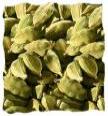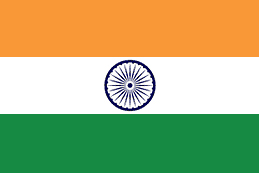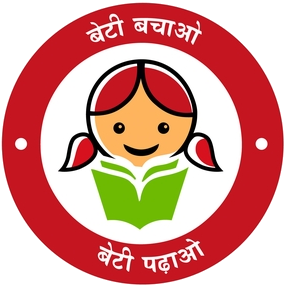Cardamom (small)

Cardamom (small)
Botanical Name
Elettaria cardamomum MatonFamily
ZingiberaceaeCommercial Part
Fruit (Capsule)Description
Cardamom of commerce is the dried ripe fruit (capsules of cardamom plant) often referred as the “Queen of Spices” because of its very pleasant aroma and taste. Cardamom is a perennial, herbaceous, rhizomatous plant. Based on the nature of panicles, three varieties are recognized viz. Malabar with prostrate panicle, Mysore with erect panicle, and Vazhukka with semi erect panicle. Plants are of medium size (2 to 3 mtr height) with pubescent leaves (on the dorsal side) and fruits globose in the case of Malabar, whereas plant robust (3 to 4 mtr height) with leaves glabrous on both sides with ovoid capsules in the case of Mysore. Vazhukka variety is a mix of both the above in physical characteristics.
Indian cardamom is offered to the international markets in different grades: 'Alleppey Green Extra Bold' (AGEB), 'Alleppey Green Bold' (AGB) and 'Alleppey Green Superior' (AGS) are names that register instant appeal worldwide. Cardamom oil is a precious ingredient in food preparations, perfumery, health foods medicines and beverages. India, a traditional exporter of cardamom to the Middle East countries where it goes mostly into the preparation of 'Gahwa' - a strong cardamom - coffee concoction without which no day is complete or no hospitality hearty for an Arab. Indian cardamom enjoys a premium preference in the Middle East, Japanese and Russians who relish it for its distinct enriching properties.
Origin and Distribution
Cultivation of cardamom is mostly concentrated in the ever green forests of Western Ghats in South India. Besides India, cardamom is grown as a commercial crop in Guatemala and on small scale in Tanzania, Sri Lanka, El Salvador, Vietnam, Laos, Thailand, Cambodia, Honduras, and Papua & New Guinea. The optimum altitudinal range on growing cardamom is 600 to 1500 mtr above MsL. The cardamom growing regions of South India lies within 8 - 30 degree N latitudes and 75-78 degree longitudes.
Uses
The major use is for the preparation of ‘gahwa’ – a strong cardamom coffee concoction which is a symbol for hospitality among Arabs. Apart from this cardamom is widely used as a flavouring material in whole and ground form. In Asia, it can add a lingering sparkle to every kind of dishes both traditional and modern. In Scandinavian countries it is used in baked goods and confectionaries. In Europe and North America it is an ingredient in curry powder and in some sausages products. Cardamom oil and oleoresin has applications in flavouring processed foods, cordials, and liquors and in perfumery and in Ayurvedic medicines.
Indian Name of Spices
Hindi : Chhoti elaichi Bengali : Chhoti elachi Gujarati : Elaychi Kannada : Yelakki Kashmiri : Aa�lbuduaa�l Malayalam : Elathari Marathi : Velchil Oriya : Alaichi Punjabi : Elaychi Sanskrit : Ela Tamil : Yelakkai or Elakkai Telugu : Yealak-Kayulu or Elakkayi Urdu : Ilaychi
Foreign Name of Spices
Spanish : Cardamomo French : Cardamome German : Kardamom Swedish : Kardemumma Arabic : Hal Dutch : Kardemom Italian : Cardamomo Portuguese : Cardamomo Russian : Kardamon Japanese : Karudamon Chinese : Pai-tou-k'ou







